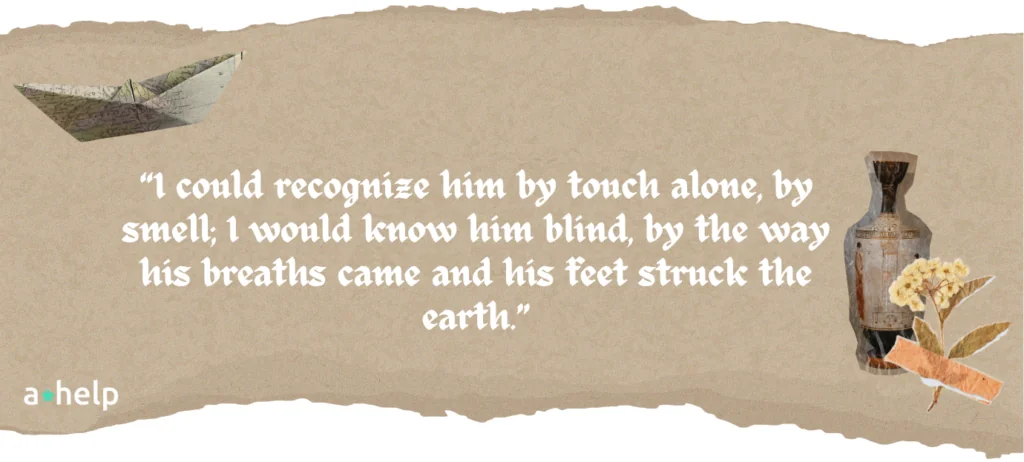“The Song of Achilles” by Madeline Miller is a retelling of the Iliad from the perspective of Patroclus, a minor character in the original epic. Published in 2011, the novel explores themes of love, honor, and the capricious nature of the gods. Through a blend of lyrical prose and a deeply humanizing narrative, Miller breathes new life into the mythological tale, focusing on the intimate relationship between Achilles and Patroclus. Here is a summary of The Song of Achilles to know, what you’re getting yourself into.

✅ AI Essay Writer ✅ AI Detector ✅ Plagchecker ✅ Paraphraser
✅ Summarizer ✅ Citation Generator
| Characteristics | Details |
|---|---|
| 🧑💻 Author | Madeline Miller |
| 🖊 Title | The Song of Achilles |
| 🗓 Publication Year | 2011 |
| 📜 Genre | Historical Fiction, Mythology, Romance |
| 🌅 Setting | Ancient Greece, during the Trojan War |
| 🫂 Main Characters | Achilles, Patroclus, Thetis, Hector, Agamemnon |
| 📚 Narrative Style | First-person perspective (Patroclus) |
| 👁 Themes | Love, Honor, Fate, Identity, Heroism |
| 🏆 Notable Awards | Orange Prize for Fiction (2012) |
The Song of Achilles Book Summary
If you ever asked yourself “What is The Song of Achilles about summary,” trying to find a quick explanation for your literature class or make up your mind on whether or not you should read it, here are the main plot points of the novel, by chapters:
- Early Life and Exile.
- Training with Chiron.
- Call to War.
- The Trojan War.
- Patroclus’s Sacrifice.
- Achilles’s Fate.
Patroclus, a young prince, is exiled to the court of King Peleus after accidentally killing another boy. At Peleus’s court, he meets Achilles, Peleus’s son, and the two form a deep and inseparable bond. Patroclus, initially an awkward and shy boy, finds companionship and acceptance in Achilles, who is destined for greatness.

As they grow older, Achilles and Patroclus are sent to Mount Pelion to be trained by the centaur Chiron. During their time with Chiron, their relationship evolves from friendship to romantic love. Chiron, wise and knowledgeable, teaches them various skills, but also imparts lessons on the nature of heroism and mortality.
The peace of their idyllic life is shattered when news arrives that Helen of Sparta has been abducted, and all the Greek kings, including Achilles, are called to war against Troy. Initially reluctant, Achilles is convinced to join the war after being promised eternal glory by his mother, the sea-nymph Thetis. Patroclus, loyal and devoted, accompanies him despite his reservations.
In Troy, Achilles quickly establishes himself as the greatest of the Greek warriors. However, conflicts arise not only with the Trojans but also within the Greek camp. The most significant of these conflicts is with Agamemnon, the Greek commander, who dishonors Achilles by taking his war prize, Briseis. In protest, Achilles withdraws from the battle, leading to a series of disastrous defeats for the Greeks.
Desperate to save their comrades, Patroclus dons Achilles’s armor and leads the Myrmidons into battle. He fights valiantly but is ultimately killed by Hector, the Trojan prince. Achilles is devastated by Patroclus’s death and returns to the battlefield, driven by grief and rage. He slays Hector and defiles his body but remains inconsolable.
Achilles knows his destiny is to die young, and Patroclus’s death only hastens this end. Eventually, Achilles is killed by Paris, Hector’s brother, fulfilling his tragic fate. In the afterlife, Patroclus’s spirit finds peace, but Achilles’s soul is restless until they are reunited.
Main Themes in The Song of Achilles Summary
“The Song of Achilles” is mainly an exploration of love and identity. The relationship between Achilles and Patroclus is depicted with tenderness and complexity, and that is why it’s directly challenging traditional notions of heroism and masculinity. Their love transcends societal expectations and becomes the emotional core of the novel.

The novel grapples with the tension between fate and free will. While Achilles is bound by the prophecy of his early death, Patroclus’s choices impact their shared destiny and they have to deal with it. This interplay raises questions about the extent of control individuals have over their lives and the nature of predestination.
Miller’s retelling humanizes mythological figures, portraying them with flaws, desires, and vulnerabilities. It is the focus on the personal experiences and emotions of the characters that allowed Madeline Miller to make the ancient story accessible and relatable to contemporary readers.
Similar Books to The Song of Achilles
If you were inspired by The Song of Achilles and want to make some additions to your “to-read” list, we have some recommendations to get your started:
“Circe” by Madeline Miller
Another mythological retelling by Miller, focusing on the life of Circe, a minor character from the Odyssey. It explores themes of identity, power, and transformation.
“The Silence of the Girls” by Pat Barker
This novel tells the story of the Trojan War from the perspective of Briseis, Achilles’s war prize. It provides a feminist retelling and delves into the lives of the women affected by the war.
“Ithaca” by Claire North
A retelling of Penelope’s story during Odysseus’s absence. It sheds light on the struggles and resilience of women in a male-dominated world.
“A Song for Achilles” by Madeline Miller (Short Story)
A shorter work by Miller that expands on themes and moments from “The Song of Achilles,” offering deeper insights into the characters’ lives.

Full Sumary of The Song of Achilles
“The Song of Achilles” is a reimagining of the Iliad that combines lyrical prose with an exploration of love, honor, and fate. Through the intimate and deeply emotional narrative of Patroclus, Madeline Miller offers readers a fresh and humanizing perspective on one of the most famous myths of all time.
FAQ
Follow us on Reddit for more insights and updates.





Comments (0)
Welcome to A*Help comments!
We’re all about debate and discussion at A*Help.
We value the diverse opinions of users, so you may find points of view that you don’t agree with. And that’s cool. However, there are certain things we’re not OK with: attempts to manipulate our data in any way, for example, or the posting of discriminative, offensive, hateful, or disparaging material.